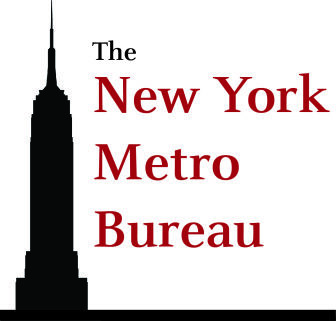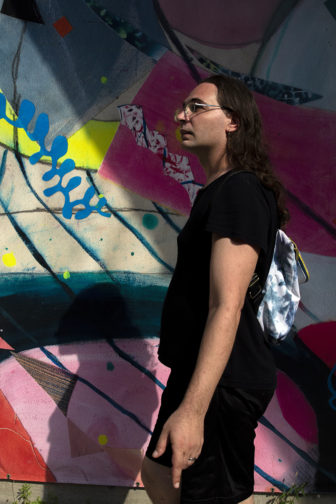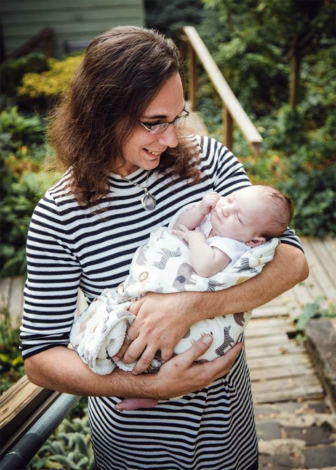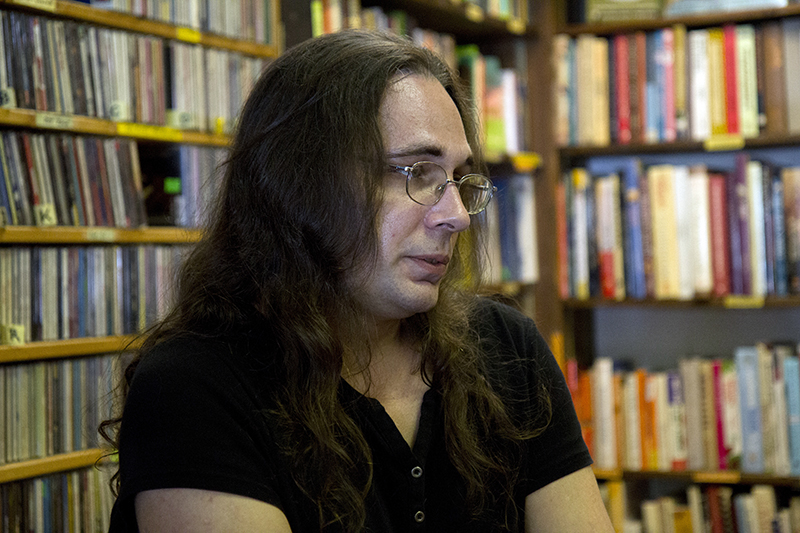Ael Ericha Loetterle’s experience with homelessness is the second of three stories on queer homeless youth as reported by the JJIE’s New York City Bureau. She goes by female pronouns she/her.
NEW YORK — In a park on the shore of the Hudson River just north of Manhattan’s Chelsea Piers is a spot called the PLUR, where sex was sold. It was supposed to stand for peace, love, unity and respect, but that wasn’t always the case.
The New York Police Department was well aware of its existence. One spring night in 2002, Ael Ericha Loetterle, a then-homeless 24-year-old trans woman, was servicing a customer. He turned out to be a plainclothes police officer who flashed his badge and arrested her.
“There’s four responses to this thing — fight, flight, freeze or fawn. I would fawn,” she said. The police department that was supposed to protect her instead victimized her when she needed that protection the most.
 Sex work is often the only work available to homeless trans youth, which leads many to become caught up in the criminal justice system. According to the 2015 U.S.Transgender Survey’s report on New York state, 61% of respondents who had come into contact with police who were aware of their transgender status had experienced some form of mistreatment — including verbal harrassment, physical assault, sexual assault and being forced to engage in sex acts in order to avoid arrest.
Sex work is often the only work available to homeless trans youth, which leads many to become caught up in the criminal justice system. According to the 2015 U.S.Transgender Survey’s report on New York state, 61% of respondents who had come into contact with police who were aware of their transgender status had experienced some form of mistreatment — including verbal harrassment, physical assault, sexual assault and being forced to engage in sex acts in order to avoid arrest.
Loetterie’s experience is not uncommon. LGBTQ kids often feel isolated from their heteronormative families and communities, and struggle to be seen in their preferred expression. They suffer high rates of physical and emotional abuse, which often lead to destructive behaviors like addiction and suicide. These traumas can lead to homelessness, where they become susceptible to survival modes considered criminal — resulting in an over-representation of queer homeless youth in the criminal justice system.
According to clinical psychologist Susan Vitti, parental support is a critical factor in either preventing or accelerating a life of trauma for LGBTQ youth.
“If parents are rejecting someone's sexual orientation, that can translate into higher risk for a variety of things — specifically homelessness, depression and other mental health issues,” she said. “The literature shows that with family support, there is a higher, better outcome for any kind of mental health consequences that an individual may be experiencing.”
Suburban scrutiny
When Loetterle was 9 years old, she decided to wear a pink tracksuit to school. It wouldn’t have been out of place had she been a cisgender girl — but as a little boy, her parents were furious.
“We were already the Oceanside hillbillies,” she said, describing her hometown in the Long Island suburb. “They called my stepmother in; [she was] slapping me all the way home like, ‘How dare I embarrass her?’”
That’s when the medical treatments began. Her parents brought her to a number of hospitals, where doctors examined her for behaviors deemed abnormal in the early 1990s.

Photo by Niamh McDonnell
Ael Ericha Loetterle walks past a mural underneath the overpass by the Staten Island Ferry.
Most families are socialized within a cisnormative system, and children grow up hearing those messages from an early age.
“They start to internalize those messages,” said S J Dodd, a professor at the Silberman School of Social Work at Hunter College. “They begin to believe that ‘If you're gay, or if you're queer, or if you're trans, you're bad.’ And then when they start to have feelings, that that's who they might be, they have to reconcile this information.”
Traumatic experiences among the trans community are pervasive. According to that Transgender Survey, 40% of respondents around the country had attempted suicide in their lifetime. The New York City Department of Health and Mental Hygiene reports that almost 20% of queer youth had attempted suicide in the past year.
During her time in the hospital, doctors discovered that Loetterle was intersex. She has both male and female reproductive organs, some of which were not immediately expressed externally. She was also diagnosed with Klinefelter, or XXY syndrome, a hormone imbalance among biological males who carry two or more X chromosomes.
A conversion nightmare
Her parents then decided to send her to a private school in Massachusetts whose mission was to convert queer kids into straight kids. It cost $65,000 a year, which was paid for by her school district. The trauma only continued from there.
The Berkshire Learning Center boarding school, now shut down, was founded in 1973 by Anthony and Marianne Rud. Loetterle, who attended for seven years, said it was psychologically damaging.
“‘We understand that you’re not normal. You’re probably never going to be,’” she recalled they said to her. “‘It’s all right, we’ll teach you how to survive your long, lonely, sad existence as you. That’s what we’re here for.’”
The school forbade her to be true to herself — “masculine” interests were encouraged while feminine ones were not.
“Macho is privilege. You'll get away with things like imposing violence,” Loetterle said. “Anything was contraband that went against pure masculinity.”
She once bought a CD of Loreena McKennitt, who writes and performs world music on piano, accordion and harp. It was taken from her room, to be replaced by Def Leppard.
When Loetterle was released, readjusting to her hometown and living with her parents again was difficult after years of mental and physical abuse.
“I was taught to look down if somebody gave me direct eye contact. I didn't touch anybody; I didn't try to. I didn't talk to people,” she said. She began using heroin to cope with her alienation.
A lack of support and broken family attachments often result in queer kids feeling isolated and invisible.
“If you have a rupture in the early caregiver connection, and you're not able to securely attach to someone who’s providing that care, you’re going to have maladaptive coping as you get older,” Vitti said. “So it makes sense that you’re going to see higher levels of addiction too.”
Loetterle remembers the night her parents kicked her out of the house — Nov. 17, 1998. She was 20, addicted to heroin and had just failed out of the Fashion Institute of Technology.

Photo by Ames Beckerman
Ael Ericha Loetterle with her baby, Khi Marie, who is now almost 2 years old.
She spent her first homeless night at “The Cube,” a plaza in lower Manhattan marked by a black metal sculpture. She then bounced around from Manhattan’s Delancey Street to Christopher Street to Tompkins Square Park in the months that followed.
“The rave kids came by, the goths came by, the vampires, the crusty punks, the glitter punks. We kind of did our thing,” she said.
Loetterle had found a sense of belonging, but begging for spare change, or “spanging,” as Loetterle called it, wasn’t enough to survive on the streets. Sex work became the surest way to meet her basic needs.
“It actually felt better than spanging,” she explained. “Because now you at least feel like somebody is appreciating at least one portion of you no matter how badly they use it.”
A study done by The Urban Institute found that trans youth in New York City are eight times more likely than nontransgender youth to trade sex for a safe place to stay. And on a national scale, nearly half of transgender people involved in sex work also reported being homeless.
Expressing herself
Today Loetterle lives a mainstream life in Staten Island, although she is currently unemployed. She still struggles to take the ferry to Manhattan. Simply presenting as trans is a “suspicion of things,” she said. NYPD officers assume she’s a sex worker.
“I’ve been stopped on that boat. I’ve been stopped in the terminal.”
She’s even been stopped walking up Victory Boulevard, a main thoroughfare in Staten Island — sometimes by as many as four cops.
The waterfront holds painful memories. A few years ago, she was raped right near the ferry. A man she’d never met forced her onto her knees and violated her. She said after years of seeing police as a threat she didn’t feel comfortable going to them to report it. She worried she wouldn’t get help. Instead, she went to a friend’s house nearby. She took a shower and borrowed a pair of cutoff shorts — her skirt had been badly torn — so she could look presentable when she got home.
It was soon after she had decided to fully express herself as a woman.
“I've never really had passing privilege. Stealth served me very, very well,” she said. Now, she’s decided to reclaim the waterfront in her mind’s eye, to create positive memories that drown out the bad ones.
Part of that positivity is her 2-year-old daughter, Khi Marie. Loetterle referred to her as “the everything that makes other stuff bearable.” While her wife was pregnant with Khi, Loetterle was taking hormones for her transition. She then began to create breast milk. Breastfeeding her baby was “the thing that most affirmed [my] femininity,” she said.
Loetterle hopes to someday start an organization designed for queer and trans youth who are fleeing violence. She knows the kinds of safeguards needed to protect and advance queer youth who are struggling.
“We will help advocate against whatever situation you're in, help with emancipation, help with legal aid,” she said. “If you are thinking of running away from wherever you are, don't just run somewhere — run here.”
She’d call it Angel House.
